
Statement of Intent 2010-2013
Table of contents
- Title Page
- Foreword from Ministers
- Ministerial Statement of Responsibility
- Introduction from the Chief Executive
- Statement of Responsibility
- Nature and Scope of Functions
- Strategic Direction
- Operating Intentions
- Managing in a Changeable Operating Environment
- Assessing Organisational Health and Capability
- Glossary (Papa Kupu)
Operating Intentions
Outcome 1: Te Tiriti o Waitangi: Māori Position as the Treaty Partner is Secured and Enhanced
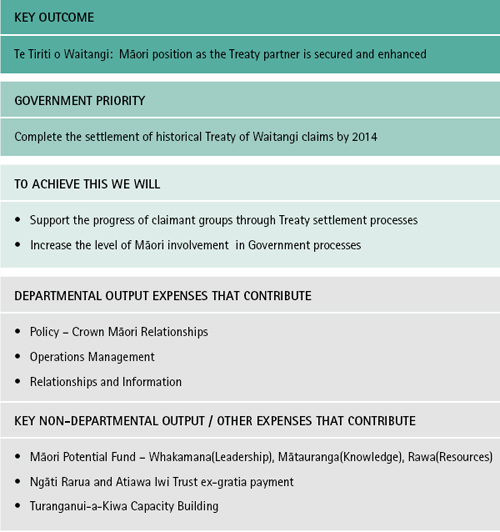
KEY OUTCOME
Te Tiriti o Waitangi: Māori position as the Treaty partner is secured and enhanced
GOVERNMENT PRIORITY
Complete the settlement of historical Treaty of Waitangi claims by 2014
TO ACHIEVE THIS WE WILL
- Support the progress of claimant groups through Treaty settlement processes
- Increase the level of Māori involvement in Government processes
DEPARTMENTAL OUTPUT EXPENSES THAT CONTRIBUTE
- Policy – Crown Māori Relationships
- Operations Management
- Relationships and Information
KEY NON-DEPARTMENTAL OUTPUT / OTHER EXPENSES THAT CONTRIBUTE
- Māori Potential Fund – Whakamana(Leadership), Mātauranga(Knowledge), Rawa(Resources)
- Ngāti Rarua and Atiawa Iwi Trust ex-gratia payment
- Turanganui-a-Kiwa Capacity Building
Context
The Treaty of Waitangi is the founding document of New Zealand. It created a nation based on the acceptance of the partnership promise that is inherent within the Treaty. Māori view the Treaty as under-pinning their development, laying the blueprint for economic independence, and a relationship with the Crown based on mutual respect and good faith. For the Crown, the essential bargain created by the Treaty requires the active protection of all things of importance to Māori, but most importantly, the protection of rangatiratanga as it is through the exercise of rangatiratanga that Māori define their own development preferences and norms. The Treaty is also the starting point for the process of reconciliation between iwi, hapū and the Crown.
What we are seeking
This outcome we are pursuing is to ensure that the Māori position as the Treaty partner is secured and enhanced.
Achievement of this outcome reflects a state in which the quality of the Treaty partnership is evident through:
- the completion of the process of reconciliation between the Crown and iwi and hapū;
- the on-going consideration of the Treaty of Waitangi in Government decision making processes;
- the participation of Māori in the systems of Government, including representational participation, decision making participation, and participation in democratic processes; and,
- an equitable quality of citizenship experienced by Māori according to their own aspirations, preferences and norms.
An environment in which the Treaty partnership is recognised, respected, and acted on is a necessary pre-requisite to enabling New Zealand as a whole to move forward together with a common purpose and a shared commitment to an optimistic future.
This outcome presents a wide scope of possible intervention points. In the short to medium term, we have refined our focus on supporting Government’s goal of settling all historical Treaty claims by 2014; and on enhancing Māori participation in government processes. We consider that these are priority points of intervention as they are necessary platforms for rebalancing the Treaty relationship, and moving towards giving effect to the partnership promise that is inherent within the Treaty.
What we are doing to contribute towards achieving this
Key areas of impact which are able to be demonstrated through our activities include:
- the progress of groups through settlement processes; and
- an increased Māori involvement in government processes.
Our output priorities that demonstrably contribute towards these results include:
Progress of groups through Treaty settlement processes, including providing advice, facilitation and brokerage on:
- the development of Treaty settlement policies;
- mandate and representation;
- governance and settlement ratification;
- the disposal of surplus Crown land under the protection mechanism;
- resolving inter and intra iwi, and Crown-iwi, disputes that arise prior to and during the negotiations process; and
- the establishment of, and investment in the capacity development of post settlement governance entities.
On a related Treaty settlements note, although not directly a component of progressing groups through Treaty settlement processes, as part of the Minister of Māori Affairs’ statutory responsibilities, we prepare for tabling in the House of Representatives an annual report on the progress made by the Crown in implementing recommendations of the Waitangi Tribunal; and we have an important role in the Government’s response to the soon to be released report of the Waitangi Tribunal on the WAI 262, the indigenous flora and fauna and intellectual property, claim.
Māori involvement in government processes
- providing advice on constitutional issues, including Māori representation;
- co-ordinating appointment processes for which the Minister of Māori Affairs is responsible, including the key appointments of Māori Land Court Judges, Waitangi Tribunal members, Māori Trustee, and members of Te Māngai Pāho, Te Taura Whiri i te Reo Māori and the Māori Television Service;
- providing advice on nominations to Government appointed organisations and bodies; and
- engaging with, and supporting other agencies to engage with, Māori.
Other key areas of our work programme that contribute to this outcome include:
- Constitutional Review and Reform: facilitating dialogue among Māori in order to inform the scope of issues to be included in the forthcoming review of, and possible reform to, New Zealand’s constitutional arrangements;
- Foreshore and Seabed Act Review: on-going provision of advice and facilitation to progress the development of replacement legislation, and to respond to any new requirements of that legislation;
- Involvement in international fora and on international issues associated with indigenous peoples, and the related rights and interests of Māori people, particularly including issues associated with the domestic application of the UN Declaration on the Rights of Indigenous Peoples;
- Advice on issues associated with Māori property rights and interests with respect to natural resources. We have a particular focus on working with other agencies to ensure that freshwater is well governed and sustainably managed to realise the maximum benefit possible for present and future environmental, cultural, social and economic values;
- Continued support during the transition period of the Māori Trustee as a stand-alone organisation, to ensure the provision of enhanced trustee and development services to Māori land owners by the Māori Trustee ; and
- Advising on the Crown’s purchase interest in the Māori Trustee.
More detailed information about our work programme, and performance in these areas, is provided in the Information Supporting the Estimates for Vote Māori Affairs, and in the Ministry’s Output Plan.
How we will demonstrate progress towards achieving this
In terms of Treaty settlements, our advice on mandate and representation enables Ministers to make decisions about whether settlement negotiations can be entered into with a particular entity; and our advice on settlement and governance ratification enables Ministers to make decisions about whether a Deed of Settlement should be finalised. We also provide facilitation and mediation services to resolve inter and intra iwi, and Crown-iwi disputes, which enable stalled negotiations to proceed. Although the overall negotiations work programme is set by the Office of Treaty Settlements, maintaining the work programme momentum, and thus meeting the overall 2014 goal, is contingent on the quality and timeliness of our work at these key junctures.
In terms of increasing Māori involvement in government processes, the Treaty relationship is premised on three key platforms – partnership, protection and participation. Participation includes participation in government processes, and is fundamental to giving effect to the Treaty’s partnership promise. We are able to have a direct influence on this type of participation, including through directly managing the Minister of Māori Affairs’ appointment responsibilities, enhancing Māori participation in governance of government appointed boards and organisations (measured through the success rate of our nominations and appointment advice), and involvement in government decision making (measured through our direct engagement with Māori on policy matters we lead).
The diagram on page 21 summarises our overall performance framework for this outcome area. Importantly, it demonstrates the linkages between our activities in this area and the impacts those activities can have on enhancing and securing the position of Māori as the Treaty partner.
Figure 3: Measuring Progress – Te Tiriti o Waitangi
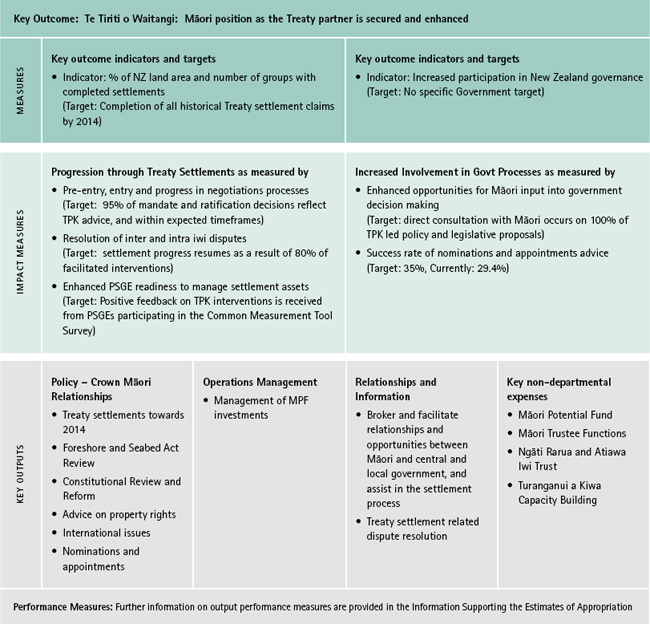
Key Outcome: Te Tiriti o Waitangi: Māori position as the Treaty partner is secured and enhanced
MEASURES
Key outcome indicators and targets
- Indicator: % of NZ land area and number of groups with completed settlements (Target: Completion of all historical Treaty settlement claims by 2014)
Key outcome indicators and targets
- Indicator: Increased participation in New Zealand governance (Target: No specific Government target)
IMPACT MEASURES
Progression through Treaty Settlements as measured by
- Pre-entry, entry and progress in negotiations processes (Target: 95% of mandate and ratification decisions reflect TPK advice, and within expected timeframes)
- Resolution of inter and intra iwi disputes (Target: settlement progress resumes as a result of 80% of facilitated interventions)
- Enhanced PSGE readiness to manage settlement assets (Target: Positive feedback on TPK interventions is received from PSGEs participating in the Common Measurement Tool Survey)
Increased Involvement in Govt Processes as measured by
- Enhanced opportunities for Māori input into government decision making (Target: direct consultation with Māori occurs on 100% of TPK led policy and legislative proposals)
- Success rate of nominations and appointments advice (Target: 35%, Currently: 29.4%)
KEY OUTPUTS
Policy – Crown Māori Relationships
- Treaty settlements towards 2014
- Foreshore and Seabed Act Review
- Constitutional Review and Reform
- Advice on property rights
- International issues
- Nominations and appointments
Operations Management
- Management of MPF investments
Relationships and Information
- Broker and facilitate relationships and opportunities between Māori and central and local government, and assist in the settlement process
- Treaty settlement related dispute resolution
Key non-departmental expenses
- Māori Potential Fund
- Māori Trustee Functions
- Ngāti Rarua and Atiawa Iwi Trust
- Turanganui a Kiwa Capacity Building
Performance Measures:
Further information on output performance measures are provided in the Information Supporting the Estimates of Appropriation
3 Māori Trustee services are reflected in this outcome area, as Crown funding is provided for the express purpose of the Māori Trustee delivering a range of Treaty obligations on behalf of the Crown.
Outcome 2: Whānau Ora: Whānau and Māori achieve enhanced levels of economic and social prosperity
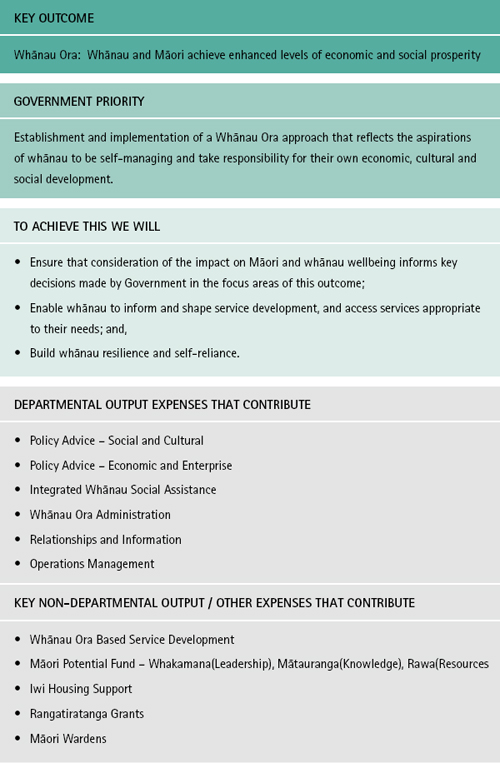
KEY OUTCOME
Whānau Ora: Whānau and Māori achieve enhanced levels of economic and social prosperity
GOVERNMENT PRIORITY
Establishment and implementation of a Whānau Ora approach that reflects the aspirations of whānau to be self-managing and take responsibility for their own economic, cultural and social development.
TO ACHIEVE THIS WE WILL
- Ensure that consideration of the impact on Māori and whānau wellbeing informs key decisions made by Government in the focus areas of this outcome;
- Enable whānau to inform and shape service development, and access services appropriate to their needs; and,
- Build whānau resilience and self-reliance.
DEPARTMENTAL OUTPUT EXPENSES THAT CONTRIBUTE
- Policy Advice – Social and Cultural
- Policy Advice – Economic and Enterprise
- Integrated Whānau Social Assistance
- Whānau Ora Administration
- Relationships and Information
- Operations Management
KEY NON-DEPARTMENTAL OUTPUT / OTHER EXPENSES THAT CONTRIBUTE
- Whānau Ora Based Service Development
- Māori Potential Fund – Whakamana(Leadership), Mātauranga(Knowledge), Rawa(Resources)
- Iwi Housing Support
- Rangatiratanga Grants
- Māori Wardens
Context
The social, economic and cultural gains experienced by many Māori over the last decade (as reflected in the Social Report 2009) have not reached a number of families. What has worked for many families over this period does not appear to be working for those amongst our most at risk citizens. The quality of life for children raised in these families and whānau is often poor. Many will struggle to fulfil their potential into adulthood. This is particularly so where the parents lack the skills, experiences and social supports necessary to underpin their children’s development. Income support and other forms of social protection, without corresponding investment in the building of resilience amongst families and whānau, has in part compounded the cycle of social deprivation by increasing the dependency of some individuals and families on social assistance from the state.
Whānau Ora is built on the premise that while the status of individuals is important, the way in which the group operates as a whole to achieve health and wellbeing for its members is also critical. The aim is to enable whānau to assume responsibility for their own affairs, for self-management and self-determination. Long term dependency on outside agencies is not consistent with Whānau Ora.
What we are seeking
This outcome we are pursuing is for whānau and Māori to achieve enhanced levels of economic and social prosperity.
Achievement of this outcome would be characterised by a state where whānau interact in a manner that provides for the best overall wellbeing of the whānau according to its own preferences and norms. We will be leading, in conjunction with the Ministry of Health and the Ministry of Social Development, the implementation of Whānau Ora to benefit all New Zealanders.
We will also continue to actively seek improvement in the level of social and economic prosperity of Māori. Consistent with our establishment legislation, the particular focus areas for this outcome are health, employment, education and whānau level indicators of economic wellbeing. We have located education indicators with the next outcome area, which incorporates education as a pathway to skills acquisition and economic success. That said, indicators of educational success are equally relevant to Whānau Ora. Accordingly, we have ascribed outcome indicators to reflect:
- Improvement in Māori life expectancy;
- Increased levels of Māori employment;
- Increased levels of Māori home ownership; and
- Increased levels of Māori household income.
At this stage, we consider these indicators to be important and relevant, but not a comprehensive reflection of a state of success for this outcome. Particular challenges arise, as government as a whole has not established outcome targets against these indicators, and because data collection is typically undertaken at the level of individual achievement. We continue to explore options for more whānau oriented measures of wellbeing and prosperity, to better reflect the intent of this outcome, and have added impetus in this area with recent government decisions to establish Whānau Ora as a new approach in the social services sector.
What we are doing to contribute towards achieving this
Key areas of impact which are able to be demonstrated through our activities include:
- Ensuring that consideration of the impact on Māori and whānau wellbeing informs key decisions made by Government in the focus areas of this outcome;
- Whānau informing and shaping service development, and accessing services appropriate to their needs; and,
- Increased whānau resilience and self-reliance.
A new development this year arises from recent government decisions to implement Whānau Ora as a new approach to the delivery of social services, with a strong focus on achieving enhanced whānau outcomes by enabling whānau to take collective responsibility for the quality of their own lives. The Government has made clear its intention to support Whānau Ora and has been guided in this by the Report of the Taskforce on Whānau-Centred Interventions Initiatives, which was released in April 2010. As the lead government agency, we will work with the Ministry of Health and the Ministry of Social Development to implement Government decisions on Whānau Ora over the coming years.
Whānau Ora places families in the centre and in control of achieving their own outcomes. While whānau will be self managing, there will also be expectations that government services deliver better results for New Zealand families. Supporting activity that is driven and shaped by whānau needs and aspirations will also require the health sector to work in a more seamless way with other parts of the social sector. A driver in the first stages of Whānau Ora implementation will be working across the three agencies to ensure better contracting practices and supporting providers to further focus on improving whānau outcomes.
This approach has a strong whole-of-government focus, requiring us to take a leadership role in co-ordinating the interface between central government social service funders and social service providers; and social service providers and whānau. Our immediate focus will be on developing more cohesive and integrated contracts and services at the provider level, and building whānau capacity to effectively engage with service providers, and exercise positive decision making over their own wellbeing and quality of life.
Other key areas of work include:
Advice on enhancing the wellbeing of whānau and Māori
- Influencing the policy settings across the health, social services, employment, housing and justice sectors;
- Leading advice across government on the opportunities and benefits of whānau as a unit of intervention for policy development and programme delivery;
- Developing an evidence base to support, and leading advice across government, on the efficacy of Māori designed, developed and delivered programmes to deliver sustainable outcomes to Māori people and their families; and
- Providing discrete reports on the quality of life and experiences of Māori.
Programme management, including:
- Delivering Whānau Social Assistance programmes;
- Delivering the Māori Wardens programme; and
- Evaluating a selection of Māori Potential Fund initiatives and programmes that support enhancing whānau wellbeing, in accordance with the agreed Evaluation Strategy and priorities.
How we will demonstrate progress towards achieving this
The main impacts we have is on:
- Ensuring that consideration of the impact on Māori and whānau wellbeing informs key decisions made by Government in the focus areas of this outcome;
- Whānau informing and shaping service development, and accessing services appropriate to their needs; and,
- Building whānau resilience and self-reliance.
Our work in this outcome area is premised on the view that bringing about positive change on the key outcome indicators is at least partly dependent on the decisions, and consequent actions, of three key actors: government, in terms of the policy decisions it takes; service providers, in terms of the effectiveness of service delivery; and whānau, in terms of the decisions they take that affect the quality of their lives. We therefore seek to influence each of these key actors, in ways that positively shape their understanding of the potential impacts of their decisions, builds their capacity to take positive decisions; and builds a social policy and service delivery sector that is more whānau centred and acts in ways that recognise whānau preferences and norms.
The diagram on page 26 summarises our overall performance framework for this outcome area. Importantly, it demonstrates the linkages between our activities in this area and the impacts those activities can have on enhancing the economic and social prosperity of Māori and whānau.
Figure 4: Measuring Progress – Whānau Ora
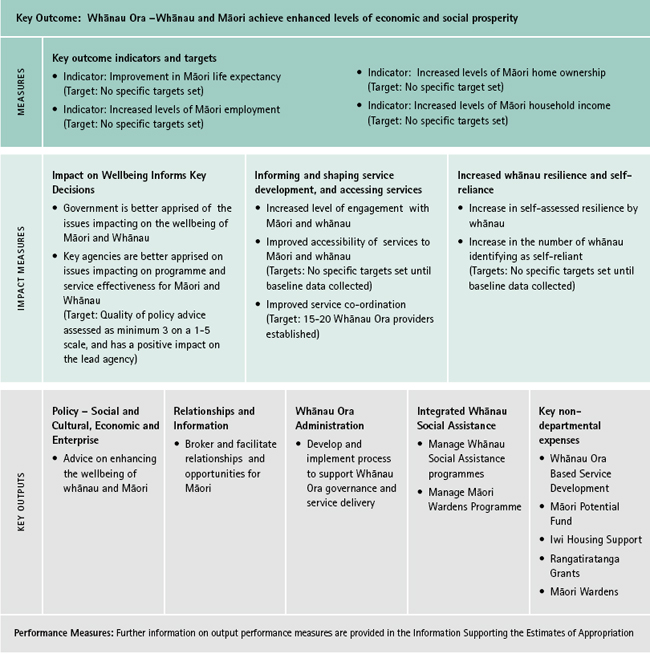
Key Outcome: Whānau Ora –Whānau and Māori achieve enhanced levels of economic and social prosperity
MEASURES
Key outcome indicators and targets
- Indicator: Improvement in Māori life expectancy (Target: No specific targets set)
- Indicator: Increased levels of Māori employment (Target: No specific targets set)
- Indicator: Increased levels of Māori home ownership (Target: No specific target set)
- Indicator: Increased levels of Māori household income (Target: No specific targets set)
IMPACT MEASURES
Impact on Wellbeing Informs Key Decisions
- Government is better apprised of the issues impacting on the wellbeing of Māori and Whānau
- Key agencies are better apprised on issues impacting on programme and service effectiveness for Māori and Whānau (Target: Quality of policy advice assessed as minimum 3 on a 1-5 scale, and has a positive impact on the lead agency) Informing and shaping service development, and accessing services
- Increased level of engagement with Māori and whānau
- Improved accessibility of services to Māori and whānau (Targets: No specific targets set until baseline data collected)
- Improved service co-ordination (Target: 15-20 Whānau Ora providers established) Increased whānau resilience and self-reliance
- Increase in self-assessed resilience by whānau
- Increase in the number of whānau identifying as self-reliant (Targets: No specific targets set until baseline data collected)
KEY OUTPUTS
Policy – Social and Cultural, Economic and Enterprise
- Advice on enhancing the wellbeing of whānau and Māori
Relationships and Information
- Broker and facilitate relationships and opportunities for Māori
Whānau Ora Administration
- Develop and implement process to support Whānau Ora governance and service delivery
Integrated Whānau Social Assistance
- Manage Whānau Social Assistance programmes
- Manage Māori Wardens Programme
Key non-departmental expenses
- Whānau Ora Based Service Development
- Māori Potential Fund
- Iwi Housing Support
- Rangatiratanga Grants
- Māori Wardens
Performance Measures:
Further information on output performance measures are provided in the Information Supporting the Estimates of Appropriation
Outcome 3: Te Ao Hurihuri: Māori Prepared for Future Opportunities
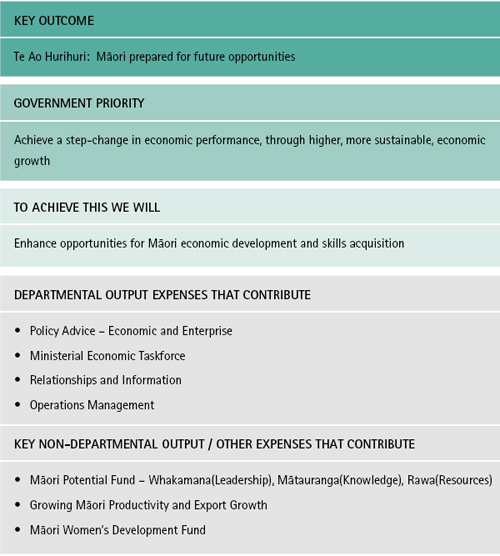
KEY OUTCOME
Te Ao Hurihuri: Māori prepared for future opportunities
GOVERNMENT PRIORITY
Achieve a step-change in economic performance, through higher, more sustainable, economic growth
TO ACHIEVE THIS WE WILL
Enhance opportunities for Māori economic development and skills acquisition
DEPARTMENTAL OUTPUT EXPENSES THAT CONTRIBUTE
- Policy Advice – Economic and Enterprise
- Ministerial Economic Taskforce
- Relationships and Information
- Operations Management
KEY NON-DEPARTMENTAL OUTPUT / OTHER EXPENSES THAT CONTRIBUTE
- Māori Potential Fund – Whakamana(Leadership), Mātauranga(Knowledge), Rawa(Resources)
- Growing Māori Productivity and Export Growth
- Māori Women’s Development Fund
Context
Late in 2007, we released our futures work, Ngā Kaihanga Hou – For Māori Future Makers, which considered the key drivers of future change in the global economy, and the investment priorities to position Māori to capitalise on future opportunities over the next twenty years. Key investment priorities identified as part of that work included: skills acquisition; diversification of the asset base; increasing participation in exporting; fostering entrepreneurship; and fostering innovation. This future focus has enduring importance, to ensure that public policy and interventions position Māori favourably for the longer term economic future.
What we are seeking
This outcome directly aligns with the key government priority of achieving a step-change in economic performance, through higher, more sustainable economic growth. Key outcome indicators for this outcome focus particularly on Māori collective wealth and productivity, and educational attainment and skills acquisition. They are:
- Growth of the Māori asset base;
- Increased value of the Māori asset base as a proportion of GDP; and,
- Increased levels of Māori educational achievement at secondary and post compulsory levels.
What we will do to contribute to achieving this
Achievement of this outcome is largely dependent on decisions taken by individual Māori learners and their whānau, asset owners, and prevailing economic conditions.
Accordingly, we have sharpened our focus in this outcome area, in line with our Futures research, on areas in which government can directly intervene and bring about positive results.
Our contribution to this outcome is thus focused on Māori achieving higher levels of participation and success in the priority areas of education, training, skills acquisition and enterprise, as these are key platforms from which to drive future economic success. Importantly, the relatively youthful construct of the Māori population means that it will make up an increasing larger proportion of the New Zealand workforce and economic engine, and thus it is critical to ensure that Māori have high standards of educational attainment and appropriate skills to drive the future economy.
Alongside this, we continue to explore opportunities to generate greater productivity and diversification of Māori collectively owned assets, and to support a policy and regulatory environment within which Māori business can flourish, while balancing the protective factors of ensuring the retention of Māori assets in Māori ownership.
Key areas of impact which are able to be demonstrated through our activities include:
- Ensuring that consideration of the impact on Māori education and skills pathways informs key decisions made by Government;
- Enhancing Māori business services; and
- Enhancing opportunities for Māori to utilise their assets.
New developments this year are consistent with the overarching goal of lifting economic performance, and include new funding in Vote Māori Affairs to grow Māori exports, and grow Māori productivity. In the latter area, there is a strong focus on improving skills and governance capabilities in the productive sectors aligned with Māori asset holdings. We will also continue to support the Ministerial Economic Taskforce established last year, and expect that its recommendations will give rise to new work areas in the future.
Other key areas of our work include:
The quality of life and experiences of Māori
- Influencing policy settings and decisions on matters related to education, training and skills pathways;
- Providing discrete reports on the quality of life and experiences of Māori; and
- Supporting the improved participation of rangatahi in training and learning opportunities.
Participation and success in business and the economy
- Administration and delivery of the Māori Business Facilitation Service;
- Supporting Māori involvement in event based economic opportunities, including the Rugby World Cup 2011, and Shanghai Expo 2010; and
- Providing discrete reports on Māori participation and success in the economy.
Enhancing Opportunities for Māori to Utilise their Assets
- Advising on options for reducing barriers to the effective utilisation of Māori assets;
- Progressing work on a new basis for the rating and valuation of Māori land; and
- Growing and developing Māori leadership and governance.
How we will demonstrate progress towards achieving this
The main impacts we have is on enhancing opportunities for Māori economic development and skills acquisition.
Our work in this outcome area recognises that the pathway to growing Māori economic performance is largely dependent on achieving an improved education and skills profile; creating an environment in which Māori business can flourish; and providing opportunities through which skilled asset managers are able to make positive decisions about asset utilisation. It also has a focus on opportunities relevant to the existing profile of the Māori asset base, and emerging economic opportunities, such as the tourism sector.
The diagram on page 30 summarises our overall performance framework for this outcome area. Importantly, it demonstrates the linkages between our activities in this area and the impacts those activities can have on positioning Māori for future opportunities.
Figure 5: Measuring Progress – Te Ao Hurihuri
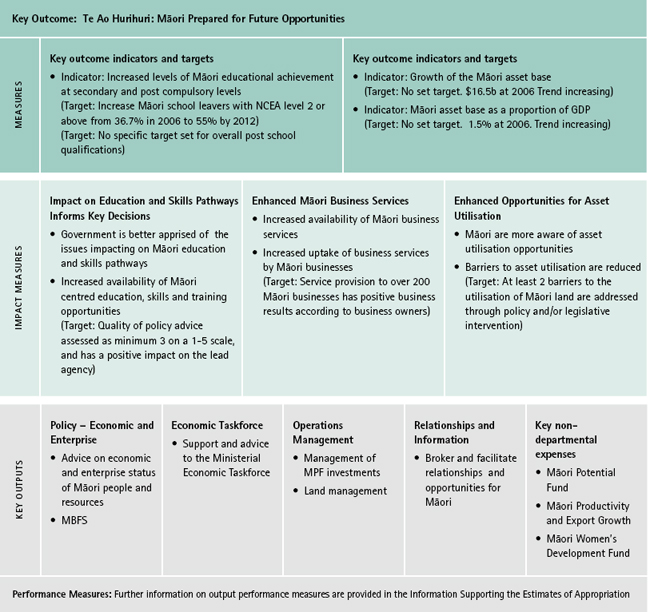
Key Outcome: Te Ao Hurihuri: Māori Prepared for Future Opportunities
MEASURES
Key outcome indicators and targets
- Indicator: Increased levels of Māori educational achievement at secondary and post compulsory levels (Target: Increase Māori school leavers with NCEA level 2 or above from 36.7% in 2006 to 55% by 2012) (Target: No specific target set for overall post school qualifications)
Key outcome indicators and targets
- Indicator: Growth of the Māori asset base (Target: No set target. $16.5b at 2006 Trend increasing) • Indicator: Māori asset base as a proportion of GDP (Target: No set target. 1.5% at 2006. Trend increasing)
IMPACT MEASURES
Impact on Education and Skills Pathways Informs Key Decisions
- Government is better apprised of the issues impacting on Māori education and skills pathways
- Increased availability of Māori centred education, skills and training opportunities (Target: Quality of policy advice assessed as minimum 3 on a 1-5 scale, and has a positive impact on the lead agency)
Enhanced Māori Business Services
- Increased availability of Māori business services
- Increased uptake of business services by Māori businesses (Target: Service provision to over 200 Māori businesses has positive business results according to business owners)
Enhanced Opportunities for Asset Utilisation
- Māori are more aware of asset utilisation opportunities
- Barriers to asset utilisation are reduced (Target: At least 2 barriers to the utilisation of Māori land are addressed through policy and/or legislative intervention)
KEY OUTPUTS
Policy – Economic and Enterprise
- Advice on economic and enterprise status of Māori people and resources
- MBFS
Economic Taskforce
- Support and advice to the Ministerial Economic Taskforce
Operations Management
- Management of MPF investments
- Land management
Relationships and Information
- Broker and facilitate relationships and opportunities for Māori
Key non-departmental expenses
- Māori Potential Fund
- Māori Productivity and Export Growth
- Māori Women’s Development Fund
Performance Measures:
Further information on output performance measures are provided in the Information Supporting the Estimates of Appropriation
Outcome 4: Te Ao Māori: Māori succeeding as Māori, more secure, confident and expert in their own culture
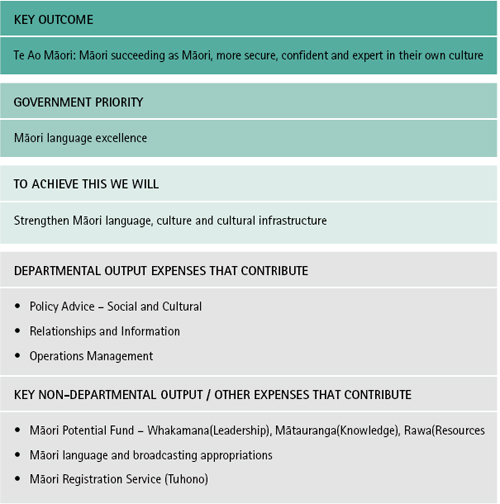
KEY OUTCOME
Te Ao Māori: Māori succeeding as Māori, more secure, confident and expert in their own culture
GOVERNMENT PRIORITY
Māori language excellence
TO ACHIEVE THIS WE WILL
Strengthen Māori language, culture and cultural infrastructure
DEPARTMENTAL OUTPUT EXPENSES THAT CONTRIBUTE
- Policy Advice – Social and Cultural
- Relationships and Information
- Operations Management
KEY NON-DEPARTMENTAL OUTPUT / OTHER EXPENSES THAT CONTRIBUTE
- Māori Potential Fund – Whakamana(Leadership), Mātauranga(Knowledge), Rawa(Resources)
- Māori language and broadcasting appropriations
- Māori Registration Service (Tuhono)
Context
Culture is the unique and distinguishing feature of Māori vis-à-vis non-Māori, and is the foundation for the key outcome of Māori succeeding as Māori, more secure, confident and expert in their own culture. In considering culture, we focus on two broad areas: the artefacts of culture (such as language and arts) and the values, norms, behaviours and infrastructure that shape the fabric of Māori society. It is well understood that those who have a strong sense of cultural attachment and identity are better positioned to uptake wider opportunities4; and that a strong and unique indigenous culture accrues significant benefits to the nation as a whole.
What we are seeking
The intent of this outcome is for Māori success, as New Zealanders and as global citizens, to be underpinned by their success as Māori, secure, confident and expert in their own culture. Key success indicators for this outcome focus on the cornerstones of culture: language and kinship. They are:
- Increased levels of Māori language proficiency and use; and
- Increased knowledge of iwi affiliation.
What we will do to achieve this
The key impact that we are able to demonstrate through our activities is that Māori language, culture and cultural infrastructure is accessible and strengthened.
A new development this year arises from the government priority of Māori language excellence. As a first step towards this, we will be undertaking a review of Māori language activity and funding across government agencies, with a view to preparing a revised Māori Language Strategy. It is expected that this review will inform approaches to how government can support the achievement of Māori language excellence.
Other key areas of our work include:
Māori Language and Broadcasting
- Maintaining the current commitment to the existing Māori Language Strategy during the course of the forthcoming review of Māori language activity and expenditure;
- Leadership of the policy and legislative reforms arising from the review of the Māori Television Service Act;
- On-going policy leadership of the Māori broadcasting and e-media strategy; and
- Advising on the Crown’s ownership interest in, and performance of, language and broadcasting agencies funded through Vote Māori Affairs.
Māori Cultural Practice and Infrastructure
- Supporting community based opportunities to strengthen Māori cultural practice;
- Progressing the marae survey, and associated marae development policy; and
- Provision of support to Tuhono, to link Māori people with their iwi.
How we will demonstrate progress towards achieving this
The main impact we have is on the accessibility and strengthening of Māori language, culture and cultural infrastructure.
Our work in this outcome area focuses on the kinship based language and cultural connections. Strengthening language and culture supports both cultural expression and identity, which benefits both Māori, and the country as a whole, especially in terms of national identity and in positioning New Zealand in the global market place.
The diagram on page 33 summarises our overall performance framework for this outcome area. Importantly, it demonstrates the linkages between our activities in this area and the impacts those activities can have on Māori succeeding as Māori.
4 Proceedings of a Conference held at the World Bank, Washington DC, Sept 27-28 1993. Environmental Sustainable Development Proceedings Series No 4 (Shelton H Davies and Katrinka Ebbe, editors) World Development Report 2000/01: Attacking Poverty (Oxford University Press, New York, 2000)
Figure 6: Measuring Progress – Te Ao Māori
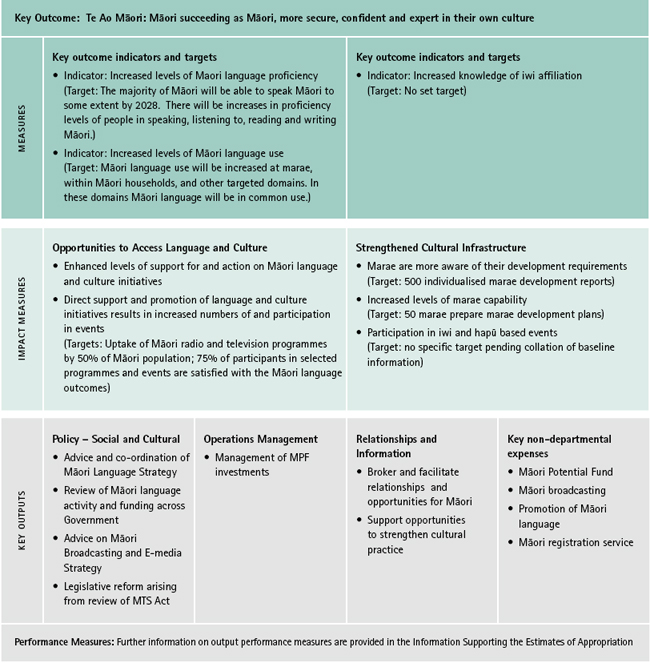
Key Outcome: Te Ao Māori: Māori succeeding as Māori, more secure, confident and expert in their own culture
MEASURES
Key outcome indicators and targets
- Indicator: Increased knowledge of iwi affiliation (Target: No set target)
Key outcome indicators and targets
- Indicator: Increased levels of Maori language proficiency (Target: The majority of Māori will be able to speak Māori to some extent by 2028. There will be increases in proficiency levels of people in speaking, listening to, reading and writing Māori.)
- Indicator: Increased levels of Māori language use (Target: Māori language use will be increased at marae, within Māori households, and other targeted domains. In these domains Māori language will be in common use.)
IMPACT MEASURES
Opportunities to Access Language and Culture
- Enhanced levels of support for and action on Māori language and culture initiatives
- Direct support and promotion of language and culture initiatives results in increased numbers of and participation in events (Targets: Uptake of Māori radio and television programmes by 50% of Māori population; 75% of participants in selected programmes and events are satisfied with the Māori language outcomes)
Strengthened Cultural Infrastructure
- Marae are more aware of their development requirements (Target: 500 individualised marae development reports)
- Increased levels of marae capability (Target: 50 marae prepare marae development plans)
- Participation in iwi and hapū based events (Target: no specific target pending collation of baseline information)
KEY OUTPUTS
Policy – Social and Cultural
- Advice and co-ordination of Māori Language Strategy
- Review of Māori language activity and funding across Government
- Advice on Māori Broadcasting and E-media Strategy
- Legislative reform arising from review of MTS Act
Operations Management
- Management of MPF investments
Relationships and Information
- Broker and facilitate relationships and opportunities for Māori
- Support opportunities to strengthen cultural practice
Key non-departmental expenses
- Māori Potential Fund
- Māori broadcasting
- Promotion of Māori language
- Māori registration service
Performance Measures:
Further information on output performance measures are provided in the Information Supporting the Estimates of Appropriation